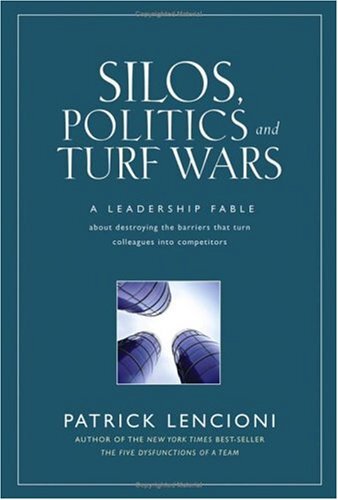Patrick Lencioni, Silos, Politics, and Turf Wars: A Leadership Fable About Destroying the Barrier That Turn Colleagues Into Competitors. Jossey-Bass, 2006.
Related volumes:
Referenced in: Ministry Teams, General Resources
LifeandLeadership.com Summary
Lencioni is the author of the best-selling books on teamwork. In this book, he makes another contribution to the subject by discussing the issue of “silos.”
Lencioni defines silos as the barriers that come between different parts of an organization which cause people who should be on the same team to work against each other. They are sometimes called departmental politics, divisional rivalries, or turf wars. In most cases, silos do not come from something executives do on purpose, but from their failure to provide everyone a compelling context for working together. Without this context, people at all levels in the organization lose focus in the details that land on their plates. This sends them in multiple directions with no compass, pursing agendas that are worthwhile but which may not best serve the mission of the organization. One group peers at another group and gets frustrated that they do not seem to be headed in the same direction. This builds into resentment, then hostility, and then competition, where they start purposely working against those colleagues. Again, the problem lies not so much in the people, as most people would like to work well across disciplines. The problem lies at the top. The executives must create a thematic goal that allows the various silos to appreciate their interdependency toward that goal.
Lencioni defines a thematic goal as a single, qualitative focus that is shared by the entire leadership team, and ultimately, by the entire organization, and it applies for only a specified period of time. When this single overriding theme becomes the top priority of the leadership team for a given period of time, it also serves to align employees toward a common direction, removing the silos. In addition to the thematic goal, the leaders must define objectives that clarify how everyone will know the organization has met the goal. These defining objectives must have three required elements: qualitative, shared, and time bound. Alongside these dynamic, ever-changing thematic goals and objectives must come standard operating objectives that remain fairly static. After these are in place, metrics may established to allow measurement of effectiveness.
In this book, Lencioni uses his standard story form to describe each of these principles at work – silos, thematic goals, defining objectives, standard operating objectives, and metrics. He also provides a few case studies to illustrate how these actually play out.
Like most business authors, Lencioni assumes the incentives and controls that are more characteristic of the private sector than of churches, so not all ministry settings will be able to use his insights. The paid ministry staff is the most likely church-based group to benefit.
From the Publisher
In yet another page-turner, New York Times best-selling author and acclaimed management expert Patrick Lencioni addresses the costly and maddening issue of silos, the barriers that create organizational politics. Silos devastate organizations, kill productivity, push good people out the door, and jeopardize the achievement of corporate goals.
As with his other books, Lencioni writes Silos, Politics, and Turf Wars as a fictional—but eerily realistic—story. The story is about Jude Cousins, an eager young management consultant struggling to launch his practice by solving one of the more universal and frustrating problems faced by his clients. Through trial and error, he develops a simple yet ground-breaking approach for helping them transform confusion and infighting into clarity and alignment.
About the Author
Patrick Lencioni is president of The Table Group, a San Francisco Bay Area management consulting firm, and author of the best-selling books The Four Obsessions of an Extraordinary Executive and The Five Temptations of a CEO. In addition to his work as an executive coach and consultant, Pat is a sought-after speaker. Prior to founding The Table Group, he worked at the management consulting firm Bain & Company, Oracle Corporation, and Sybase, where he was vice president of organizational development. He is on numerous advisory boards and sits on the National Board of Directors for the Make-A-Wish Foundation of America. Over the years, Pat has worked with hundreds of executive teams and CEOs—all struggling, at one time or another, with the potential for dysfunction among their teams.
Pat lives with his wife, Laura, and their twin boys, Matthew and Connor, in the San Francisco Bay Area. You can reach him at The Table Group’s web site, www.tablegroup.com, or at patricklencioni@tablegroup.com.
***For additional information on this resource, including reviews, click the bookstore links. Check the reference at page top or the links below for resource guides on related topics.***
See Resources on Over 100 Areas of Ministry Leadership:


